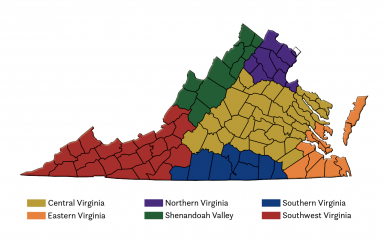Updated Sept. 1, 2022
Henrico County’s Altria Group Inc. advertises on its website that it is “moving beyond smoking,” although the owner of Philip Morris USA still is one of the world’s largest producers of cigarettes and other tobacco products.
Now the 6,000-employee, $26 billion corporation may have to move beyond smoking more quickly than it anticipated.
As part of the Biden administration’s cancer moonshot initiative, which aims to cut U.S. cancer deaths by 50% during the next 25 years, the U.S. Food and Drug Administration has said it plans to limit the amount of nicotine in cigarettes “to minimally addictive or nonaddictive levels.” (The FDA is expected to issue the proposed rule in May 2023, at which time it would be open for public comment.)
Additionally, the FDA plans to ban vaping products manufactured by Washington, D.C.- based Juul Labs Inc., in which Altria has a 35% financial stake. Juul’s products were still on shelves as of August after a July FDA decision to further review studies comparing e-cigarettes with conventional cigarettes, a process without an announced timeline.
But the fact that either move could happen in the future poses challenges to Altria’s long-term profitability and sustainability.
In addition to the federal government’s aims, Altria has other problems: The U.S. International Trade Commission forced Philip Morris‘ IQOS tobacco-heating system out of the U.S. market in September 2021 over a patent dispute. And the lack of a federal law governing cannabis sales has kept Altria’s $1.8 billion investment in Canadian cannabis company Cronos Group Inc. from paying off.
In a late July earnings call, Altria CEO Billy Gifford, who was promoted from chief financial officer to CEO in April 2020, acknowledged this was “a pivotal point in the U.S. tobacco industry.” A month earlier, The Wall Street Journal deemed it an “existential threat” to Big Tobacco — and Altria in particular.
No Juul in the crown
When Altria released its 2022 second- quarter financial report in July, its net revenues for the quarter were $6.54 billion, down 5.7% from the second quarter in 2021, hewing closely to the company’s predictions for this year.
Meanwhile, Altria’s $12.8 billion investment in Juul, the California-based vaping company that has come under federal scrutiny (as well as numerous lawsuits) over its appeal to underage smokers, sank to a worth of $450 million as of June 30.
According to Altria, it has an option to be released from its noncompete agreement with Juul if the vaping manufacturer is barred from selling its vape products for a year or more in the U.S. or if Altria holds no more than 10% of its initial investment in Juul — in other words, $1.28 billion, a threshold it has already passed.

But Altria has not yet sought to be released from its noncompete agreement because the company would also lose certain rights on Juul’s board.
“At this time, we continue to believe that these investment rights are beneficial to us,” Altria spokesperson Jennifer Kelly said via email. “Therefore, we have not opted to be released from our noncompete obligations at this time, but we retain the option to do so in the future.”
Steve Marascia, an analyst at Richmond– based investment firm Capitol Securities Management who follows Altria’s progress and owns stock in the company, rates Altria with a “buy” recommendation. He says the FDA’s movement toward banning Juul’s e-cigarettes and mandating lower nicotine levels doesn’t pose an immediate risk to Altria.
Altria is “still generating a lot of cash flow,” he says, which allows the company to continue paying dividends — an item of interest to many investors, who have seen Altria increase dividends for 53 consecutive years. “The dividend is very key for the stock itself, and the ability to maintain the dividend will be important for the stock.”
In late August, Altria’s board voted to boost its quarterly dividend by 4.4% to 94 cents per share, up from 90 cents. The quarterly dividend is payable Oct. 11 to shareholders of record as of Sept. 15.
But ultimately, Altria will need to diversify from cigarettes, Marascia notes. “Their options are either they seek other products, make acquisitions or potentially merge with another company.”
Past diversification
Earlier this century, Altria was a more diversified company. Originally known as Philip Morris Cos., it changed its name in 2003 to the altruistic-sounding Altria Group in part to distance itself from its tobacco business.
This followed years of bad press and lawsuits over cancer deaths. In 1994, seven of the nation’s top tobacco CEOs, including Philip Morris USA’s William Campbell, testified before Congress that they didn’t believe nicotine was addictive. Four years later, Philip Morris and the top three other tobacco manufacturers entered into the Master Settlement Agreement, agreeing to settle state government lawsuits to recover tobacco-related health costs. Under the agreement, the four Big Tobacco companies agreed to pay at least $206 billion to the 46 participating state governments (including Virginia) over 25 years.
At the beginning of 2007, Altria owned both Philip Morris USA and Philip Morris International Inc. and held an 88.1% stake in Kraft Foods Inc. — but not for long. In March 2007, Altria spun off the maker of Oreos and Oscar Mayer hot dogs as a separate stock, separating from Altria, which had acquired Kraft for $13.1 billion in 1988. Altria started its investment in food products in 1985 with the $5.8 billion purchase of General Foods Corp., maker of products such as Tang drink mix, Hostess snack cakes and Maxwell House coffee.
But amid more legal woes — including the company’s loss of a federal lawsuit in 2006 brought against Altria’s Philip Morris USA and co-defendants R.J. Reynolds Tobacco Co. and Lorillard Tobacco Co. — and declining tobacco sales, Altria’s diversification efforts were scaled back during the following decade.
In 2008, as part of an ongoing restructuring process, Altria also spun off Philip Morris International, its overseas tobacco operation, in a move aimed to free PMI of agreements governing Altria’s domestic cigarette business. At the same time, Altria decamped from its New York corporate headquarters to the homier climes of Henrico County, where Philip Morris USA was already based.
The following year, Altria purchased UST Inc., the largest producer of smokeless tobacco products such as snuff and chewing tobacco, as well as the owner of the Chateau Ste. Michelle wine brand, which Altria sold for $1.2 billion in cash to New York private equity firm Sycamore Partners in 2021.
Today, Altria’s tobacco sales are mostly confined to the United States, and it made two large investments in 2018 to bolster its future in the domestic markets for cannabis and vaping devices. The company says it is “committed to working with policymakers and stakeholders to create a regulated legalized [cannabis] market in the U.S.,” while the House of Representatives and Senate grapple toward a unified policy.
While Altria’s $1.8 billion investment in Canada’s Cronos Group could be viewed as a smart preparation for a future U.S. cannabis retail market, the tobacco manufacturer’s $12.8 billion investment in Juul in 2018 is widely viewed as a massive error that went south almost immediately.
Beginning in November 2019 with a lawsuit by California’s attorney general, Juul has been buffeted with hundreds of lawsuits and a federal ban on its flavored nicotine products. Plaintiffs claim the company’s flash drive-mimicking vapes and fruit- and candy-flavored nicotine products were designed to appeal to underage smokers at a moment when fewer young people were smoking cigarettes, instead of adults trying to quit smoking, as the company has claimed.
Then-California Attorney Gen. Xavier Becerra accused Juul of adopting “the tobacco industry’s infamous playbook, employing advertisements that had no regard for public health and searching out vulnerable targets.”
However, even as many of the lawsuits against Juul have been settled, Gifford and other officials at Altria continue to oppose a full ban on e-cigarettes, which they claim present safer alternatives to cigarettes for people trying to quit smoking.
In his July 28 earnings announcement, Gifford said, “The FDA has the opportunity to create a mature, regulated marketplace of smoke-free products that can successfully realize tobacco-harm reduction and improve the lives of millions of adult smokers. … We continue to believe that harm reduction, not prohibition, is the best path forward.”
John Boylan, a senior equity analyst for financial services firm Edward Jones, says that the short-term impact from the proposed FDA Juul ban is negligible, but it does point to the need for Altria to consider strategies for long-term sustainability.
“Altria gets the vast majority of its sales and profits from traditional tobacco,” Boylan says. “Juul is a small contributor. Therefore, if Juul is removed from the market, it should not have a meaningful impact on our short-term earnings-per-share estimate. However, we believe this points toward the need for Altria to accelerate and intensify its investments in alternative nicotine-delivery systems sooner rather than later.”
Glowing embers
Nevertheless, Altria still faces other challenges, including the continued U.S. ban on its IQOS heated tobacco product, produced by partner and former subsidiary Philip Morris International, which continues to market the product in other countries.
The U.S. International Trade Commission ruled in September 2021 that the device violated two of rival R.J. Reynolds Tobacco Co.’s patents, and it issued a cease-and-desist order against Altria, a decision backed by the Biden administration in November 2021.
Like vaping devices, heated tobacco products are viewed within the industry as harm-reduction measures to help smokers wean themselves from their addictions to traditional cigarettes. With heated tobacco’s limited flavors of menthol and regular tobacco, though, IQOS and similar devices are less favored by teens and young adults.
Altria and PMI began selling IQOS products in the U.S. in October 2019, but R.J. Reynolds filed its patent complaint with the ITC in May 2020, leading to the removal of both IQOS and Marlboro HeatSticks from U.S. markets last year.
The ITC ruling left PMI and partner Altria with two options: Produce the device domestically or change the design, which would require FDA approval and take longer. In February, PMI said it would start manufacturing its IQOS devices in the United States, in hopes of returning the product back to U.S. stores by the first half of 2023. Altria says it is “focused on returning IQOS to the market as soon as possible.” In the meantime, it’s investing in marketing its other smoke-free products, including Copenhagen dipping tobacco and on! pouches.
Another wrinkle for Altria is a failed reunion with PMI, which collapsed in November 2021, two years after the two companies said they began discussing an all-stock merger. Even worse for Altria, PMI’s proposed $16 billion purchase of Swedish Match AB, announced in May, could set up the former subsidiary as a direct competitor to Altria in smokeless-tobacco sales, although the deal was delayed to October.
When the merger was still in motion, financial analysts said banding together seemed to be a wise decision because PMI and Altria are viewed as parts of a diminishing industry.
“The biggest problem is that the cigarette industry is seeing an annual decline of cigarette usage,” notes Marascia. “They are going to need something to buffer that decline. It is not just Altria — all the tobacco companies are seeing the same rate of decline.”
Despite the obstacles, the end is not nigh for Altria, if only because of governmental red tape, says Clive Bates, a longtime tobacco control advocate and a consultant on public health, energy and environmental policy based in London.
He believes that reduced nicotine standards “will never happen” in the U.S. because Congress will likely assert control over such a big issue with impacts on so many factors beyond the FDA’s jurisdiction, including tobacco farming, the supply chain, state tax revenues and law enforcement.
Anti-smoking measures from the FDA are notoriously slow to take effect. A 2012 edict by the agency ordering tobacco manufacturers to include graphic warning labels on all U.S. cigarette packages has been postponed seven times in court as of this summer, with the latest deadline set for January 2023.
Amid the turmoil, Altria has notched one small success recently, with retail shares of Swiss oral nicotine pouches on! expanding from 2% of the U.S. market in 2021’s second quarter to 4.9% in 2022 — although net revenues dropped from $693 million in 2021 to $665 million during the same periods, in part due to lower shipment volume and higher promotional budgets, although Gifford says he’s encouraged nonetheless.
Altria owns an 80% interest in Helix Innovations LLC, which produces on!, a deal reached in 2019 with Burger Söhne Holding AG for $372 million. Altria subsidiary Helix was formed at closing, and on! has been available in the U.S. since 2016.
Marascia says he isn’t giving up hope on Altria’s future. “They have stated they want to offer other products [as alternatives to cigarettes] for years. I don’t know what products they are going to go with now. They might come up with something totally new — you never know.”


